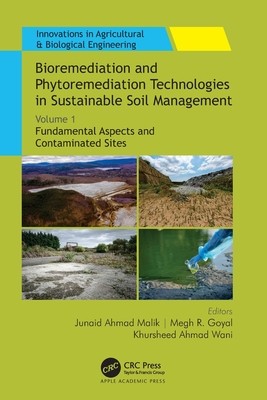
- We will send in 10–14 business days.
- Publisher: Apple Academic Press
- ISBN-10: 1774639580
- ISBN-13: 9781774639580
- Format: 15.6 x 23.4 x 1.9 cm, minkšti viršeliai
- Language: English
- SAVE -10% with code: EXTRA
Bioremediation and Phytoremediation Technologies in Sustainable Soil Management (e-book) (used book) | bookbook.eu
Reviews
Description
This 4-volume set focuses on the use of microbial bioremediation and phytoremediation to clean up pollutants in soil, such as pesticides, petroleum hydrocarbons, metals, and chlorinated solvents, which reduce the soil's fertility and renders it unfit for plant growth.
Volume 1: Fundamental Aspects and Contaminated Sites begins with an overview of phytoremediation and the role of environmental factors. It goes on to introduce soil assessment techniques and offers methods of remediation designed to combat soil and agricultural degradation. It discusses soils contaminated by heavy metals; microbial and phytoremediation-based removal of polycyclic aromatic hydrocarbons (PAHs) from coal, crude oil, and gasoline; microbial bioremediation and amelioration of pesticide-contaminated soils; phytoremediation techniques for biomedical waste contaminated sites; as well as biomediation processes for human waste sites. Biopesticides are also explained as an alternative to conventional pesticides.
Other volumes in the 4-volume set:
- Volume 2: Microbial Approaches and Recent Trends
- Volume 3: Inventive Techniques, Research Methods, and Case Studies
- Volume 4: Degradation of Pesticides and Polychlorinated Biphenyls
Together, these four volumes provide in-depth coverage of the mechanisms, advantages, and disadvantages of the bioremediation and phytoremediation technologies for safe and sustainable soil management.
EXTRA 10 % discount with code: EXTRA
The promotion ends in 21d.03:25:21
The discount code is valid when purchasing from 10 €. Discounts do not stack.
- Publisher: Apple Academic Press
- ISBN-10: 1774639580
- ISBN-13: 9781774639580
- Format: 15.6 x 23.4 x 1.9 cm, minkšti viršeliai
- Language: English English
This 4-volume set focuses on the use of microbial bioremediation and phytoremediation to clean up pollutants in soil, such as pesticides, petroleum hydrocarbons, metals, and chlorinated solvents, which reduce the soil's fertility and renders it unfit for plant growth.
Volume 1: Fundamental Aspects and Contaminated Sites begins with an overview of phytoremediation and the role of environmental factors. It goes on to introduce soil assessment techniques and offers methods of remediation designed to combat soil and agricultural degradation. It discusses soils contaminated by heavy metals; microbial and phytoremediation-based removal of polycyclic aromatic hydrocarbons (PAHs) from coal, crude oil, and gasoline; microbial bioremediation and amelioration of pesticide-contaminated soils; phytoremediation techniques for biomedical waste contaminated sites; as well as biomediation processes for human waste sites. Biopesticides are also explained as an alternative to conventional pesticides.
Other volumes in the 4-volume set:
- Volume 2: Microbial Approaches and Recent Trends
- Volume 3: Inventive Techniques, Research Methods, and Case Studies
- Volume 4: Degradation of Pesticides and Polychlorinated Biphenyls
Together, these four volumes provide in-depth coverage of the mechanisms, advantages, and disadvantages of the bioremediation and phytoremediation technologies for safe and sustainable soil management.


Reviews